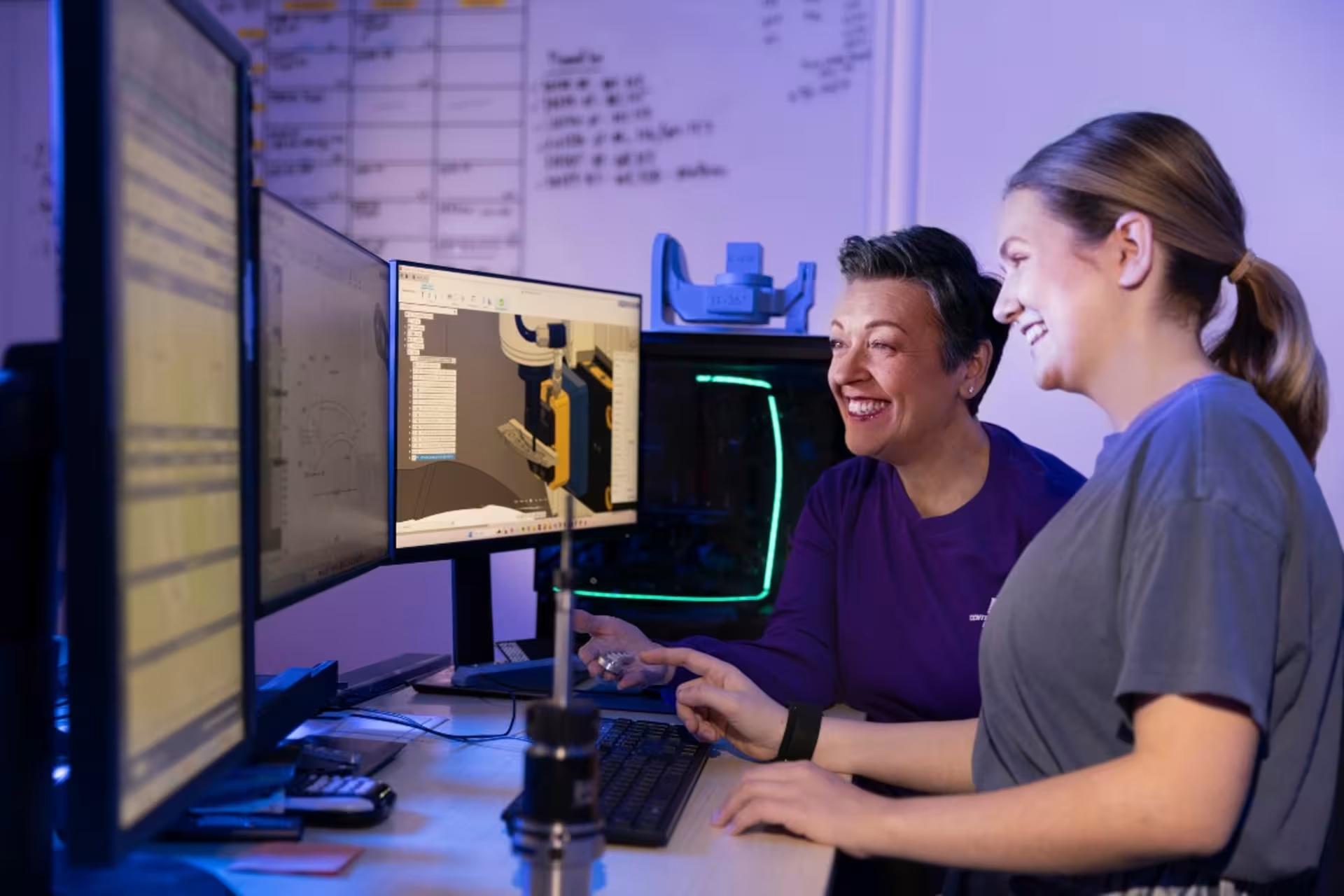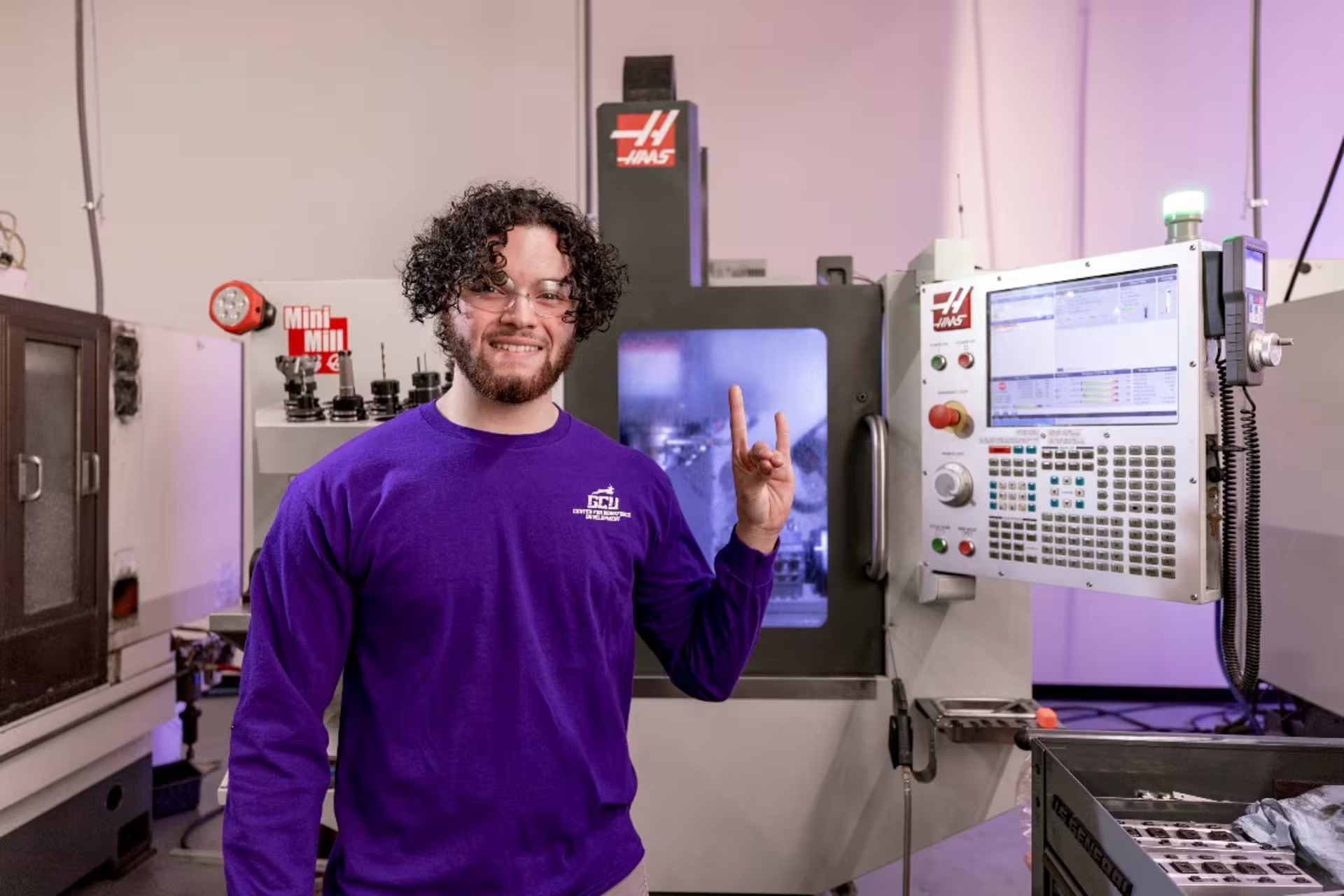
Bachelor of Science (BS) in Mechanical Engineering: Aerospace Emphasis
Explore Aerodynamics, Propulsion and Aerospace Design
The Bachelor of Science (BS) in Mechanical Engineering with an Emphasis in Aerospace is a dynamic and specialized program tailored for aspiring engineers fascinated by the expansive skies and the wonders of aerospace technology. This program includes courses in aerodynamics, propulsion, flight control systems and aerospace design.

Campus: $8,250 per semester [More Info]
Up to 90 credits, only 84 can be lower division
Credits: Fill out the Lopes Eval to find out what will transfer
Admission Requirements (Bachelor's)
- 16+ years old
- High School Graduate
- 3.0+ Unweighted GPA
OR 2.5+ Unweighted GPA and
- ACT: 19
- SAT: 1000*
Admission requirements may differ based on degree level, program and modality, or transfer status. Some programs of study may require a higher GPA and/or other qualifying criteria for admission. Please review full admission and program requirements in the University Policy Handbook.
*Math and reading only on a 1600 point scale (test date after 3/1/2016). SAT score of 1380 required for 2400 point scale (test date before 3/1/2016).
Earn Your BS in Mechanical Engineering: Aerospace Emphasis From GCU
GCU’s mechanical engineering degree: aerospace emphasis is designed for engineering enthusiasts captivated by aerospace technology. It's a specialized track within mechanical engineering tailored for those eager to explore aircraft and spacecraft design, aerodynamics and materials science specific to the aerospace industry. This program may be ideal if you aspire to work in aerospace engineering, aircraft design or space exploration.
As a GCU student, you will have access to technology and laboratory equipment, such as the technologies found in our Mechanical Materials Lab and Computer-Aided Engineering Lab. With a focus on practical learning, lecture- and lab-based courses, research, and guidance from industry professionals, GCU can offer an immersive educational experience.
Take Aerospace Engineering Courses on Campus
GCU invites you to apply to join our vibrant campus community in Phoenix. Earn your BS in Mechanical Engineering degree: aerospace emphasis alongside other students eager to develop technological innovations in the aerospace field. Benefit from lively academic discussions with peers and faculty members who are knowledgeable in their fields. At the GCU campus, you’ll find plenty of opportunities to embrace a healthy school-life balance, with lots of recreational activities, sporting teams and events, and on-campus worship activities to nurture your soul.
This Degree Is Offered on Campus
Topics Covered in This Mechanical Engineering Program
Throughout the degree program, you will explore a wide range of math and science courses. Chemistry, physics, calculus, circuits and programming all serve a pivotal role in the career of an engineer. In addition to these foundational courses, you will take courses specific to the aerospace emphasis. The program is designed to give you training as a mechanical engineer while taking a specialized set of classes in your junior and senior years that teach skills in the aerospace industry.
Aerospace engineering courses at GCU cover a range of topics, including:
The application of integral, multivariable and vector calculus concepts to practical scenarios
The solutions and qualitative study of linear systems of ordinary differential equations
The fundamental theories of control systems and their applications to flight control
Fluid statics, laminar and turbulent flow, pipe flow, lift, drag and measurement techniques
Aerospace Engineering Coursework
In the aerospace engineering courses, you will delve into a diverse range of subjects. The progressive coursework expands on foundational concepts and their practical applications by studying essential skills in scientific methods and processes. Hands-on laboratory experiences can allow you to put theoretical knowledge into practice.
This engineering degree program also includes two capstone courses, which require you to work as part of a group to develop an aerospace engineering design project intended to solve an actual problem in the field. The first capstone course involves the development of the project proposal and the execution of a feasibility study, while the second capstone course will guide you through the implementation and presentation of your applied research project.
Some of the competencies included in the Bachelor of Science in Mechanical Engineering: aerospace emphasis include:
"Coming out of GCU, I will have had two to three years of work experience. When SpaceX saw that on my resume, they were impressed. They gave me an offer letter after the second interview. I was able to skip the third interview. They said, ‘We’d like to have you over at SpaceX.'"
"Coming out of GCU, I will have had two to three years of work experience. When SpaceX saw that on my resume, they were impressed. They gave me an offer letter after the second interview. I was able to skip the third interview. They said, ‘We’d like to have you over at SpaceX.'"
Career Paths for Mechanical Engineering: Aerospace Graduates
As an aerospace engineer, you may have an opportunity to design aircraft as well as other aerospace technology such as missiles or satellites.(See disclaimer 1) Aerospace engineers may also propose suggestions for efficiency and improvement and may be involved in projects for national security. Typically, aerospace engineers are involved from the research phase all the way through manufacturing and the testing of the technology.(See disclaimer 1 )Those in this role may choose to specialize in a related field such as thermodynamics, flight mechanics or control systems throughout their career.(See disclaimer 2)
A BS in Mechanical Engineering: aerospace emphasis can deliver specialization while offering the opportunity to build a foundation of competencies needed to pursue a variety of careers in engineering.
Some careers that may be related to this type of academic background include:
Aerospace engineer
Architectural and engineering manager
Mechanical engineer
Cost estimator
Median annual wage of aerospace engineers in May 2023(See disclaimer 3)
Estimated job growth for aerospace engineers from 2022 to 2032(See disclaimer 4)
An ABET Accredited Program
The BS in Mechanical Engineering is accredited by the Engineering Accreditation Commission of ABET, www.abet.org, under the commission’s General Criteria and Program Criteria for Mechanical Engineering.
The Higher Learning Commission has continually accredited GCU since 1968. The College of Engineering and Technology shares the university’s commitment to upholding the principles and standards established by our accrediting bodies.

BS in Mechanical Engineering: Aerospace Emphasis FAQs
If you’re considering becoming an aerospace engineer, you may have some questions. Here are answers to some frequently asked questions about this field. If you have questions related to GCU’s BS in Mechanical Engineering: aerospace emphasis, fill out the form on this page to speak to a university counselor.
What should I major in to become an aerospace engineer?
Does NASA hire aerospace engineers?
How hard is aerospace engineering?
What is an average aerospace engineering salary?
Program Curriculum
General Education Requirements
Required General Education Courses
Core Courses

Take the first step toward pursuing your future career by applying to GCU’s BS in Mechanical Engineering: aerospace emphasis. Fill out the form to speak to a university counselor about achieving your professional goals.
- Indeed (2022, July 21). Top Careers in Aerospace Engineering. Retrieved Nov. 17, 2023.
- U.S. Bureau of Labor Statistics (2023, Sept. 6). What Aerospace Engineers Do. Occupational Outlook Handbook. Retrieved Nov. 27, 2023.
- The earnings referenced were reported by the U.S. Bureau of Labor Statistics (BLS), Aerospace Engineers as of May 2023, retrieved on April 23, 2024. Due to COVID-19, data from 2020 to 2023 may be atypical compared to prior years. BLS calculates the median using salaries of workers nationwide with varying levels of education and experience. It does not reflect the earnings of GCU graduates as aerospace engineer, nor does it reflect the earnings of workers in one city or region of the country or a typical entry-level salary. Median income is the statistical midpoint for the range of salaries in a specific occupation. It represents what you would earn if you were paid more money than half the workers in an occupation, and less than half the workers in an occupation. It may give you a basis to estimate what you might earn at some point if you enter this career. Grand Canyon University can make no guarantees on individual graduates’ salaries. Your employability will be determined by numerous factors over which GCU has no control, such as the employer the graduate chooses to apply to, the graduate’s experience level, individual characteristics, skills, etc. against a pool of candidates.
- COVID-19 has adversely affected the global economy and data from 2020 to 2022 may be atypical compared to prior years. Accordingly, data shown is effective September 2023, which can be found here: U.S. Bureau of Labor Statistics, Occupational Outlook Handbook, Aerospace Engineers, retrieved on April 23, 2024.
- U.S. Bureau of Labor Statistics (2023, Sept. 6). How To Become an Aerospace Engineer. Occupational Outlook Handbook. Retrieved Nov. 17, 2023.
- NASA (n.d.). Engineering. Retrieved Nov. 17, 2023.


